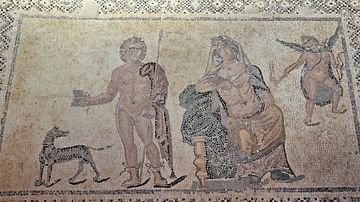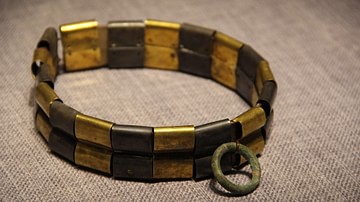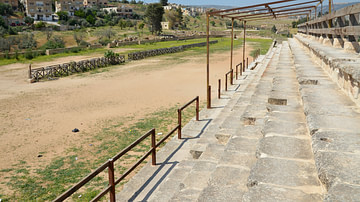Search
Search Results

Definition
Phaedra
Phaedra is a princess of Crete and the wife of the Greek hero Theseus in Greek mythology. She is one of the main characters in Euripides' (c. 484-407 BCE) Greek tragedy Hippolytus, which recounts how her love for Thesesus' son Hippolytus...

Article
Legacy of the Ancient Romans
The legacy of the ancient Romans – from both the time of the Roman Republic (509-27 BCE) and the time of the Roman Empire (27 BCE - 476 CE) – exerted a significant influence on succeeding cultures and is still felt around the world in the...

Article
A Brief History of the Dog Collar
The dog collar, so often taken for granted, has a long and illustrious history. Anyone fortunate enough to share their life with a dog in the present day is participating in an ancient tradition every time they place a collar around their...

Image
Hippodrome of Caesarea Maritima
The hippodrome of Caesarea Maritima was built by Herod the Great (r. 37-4 BCE) for the inauguration of the city in 10/9 BCE. It was the venue of the Actian Games, instituted by King Herod in honour of the Roman emperor Augustus (r. 27 BCE...

Image
Delphi Charioteer
Life-size bronze charioteer statue, set up by the tyrant Polyzalus from Sicily as a tribute to Apollo, likely to commemorate his victory in the Pythian Games held at Delphi every four years in 474 or 470 BCE. It was part of a larger four-horse...

Image
Greek Amphora with a Quadriga
A depiction of a quadriga with a charioteer waiting for the start of the chariot race on an Attic black-figure kylix, dated to 510 BCE.
National Archaeological Museum of Athens.

Image
Jerash Hippodrome
The Hippodrome of Gerasa in modern-day Jerash in Jordan is the smallest of the 48 Roman circus buildings known today, measuring about 250 x 50 m. However, it is one of the best-preserved Roman circuses in its functional and technical elements...

Article
Song of Everlasting Sorrow
The Song of Everlasting Sorrow is a narrative poem of the Tang Dynasty (618-907 CE) inspired by the love affair between Xuanzong (r. 712-756 CE), the seventh emperor of the dynasty, and his consort Lady Yang. It was written by the Chinese...

Article
Cavalry in Ancient Chinese Warfare
The use of cavalry in Chinese warfare was a significant development which was largely responsible for the abandonment of chariots, that vehicle being much slower and more cumbersome to manoeuvre in battle conditions. The greater speed and...

Article
Pherenike the Female Olympic Trainer
Pherenike (l. c. 388 BCE, also known as Kallipateira) was an athlete from Rhodes who, because she was a woman, could not compete in the Olympic Games and, as a married woman, was not allowed to even watch them. Defying these rules and risking...